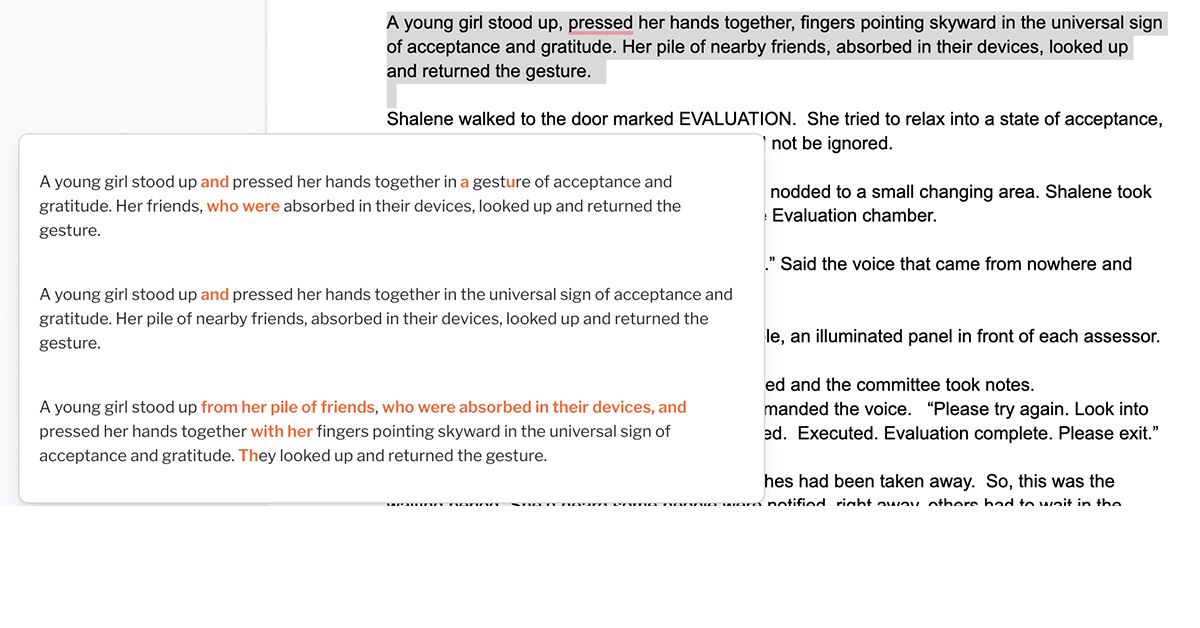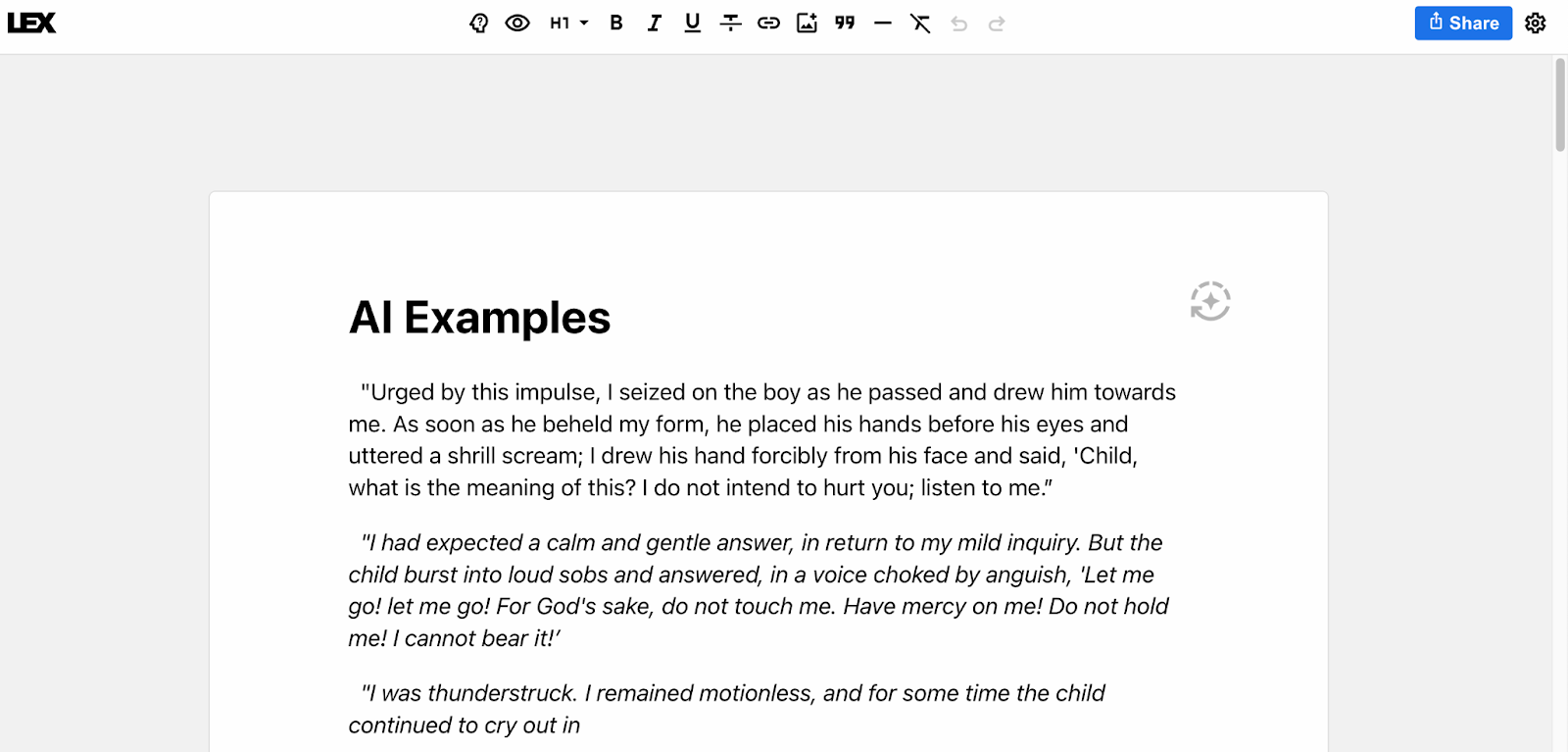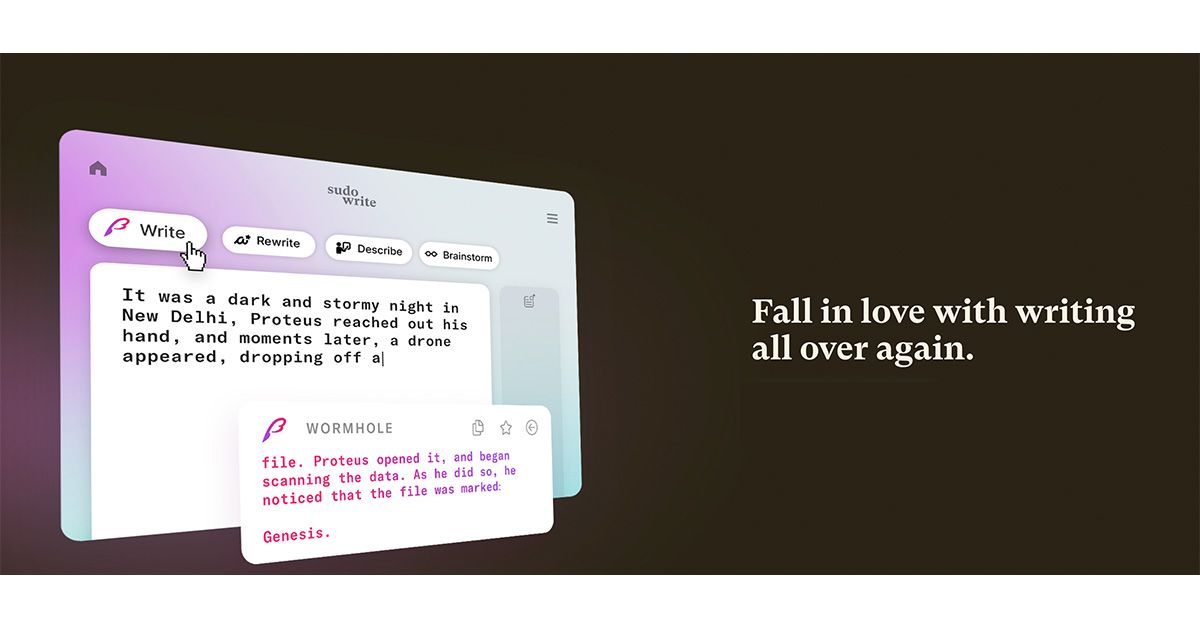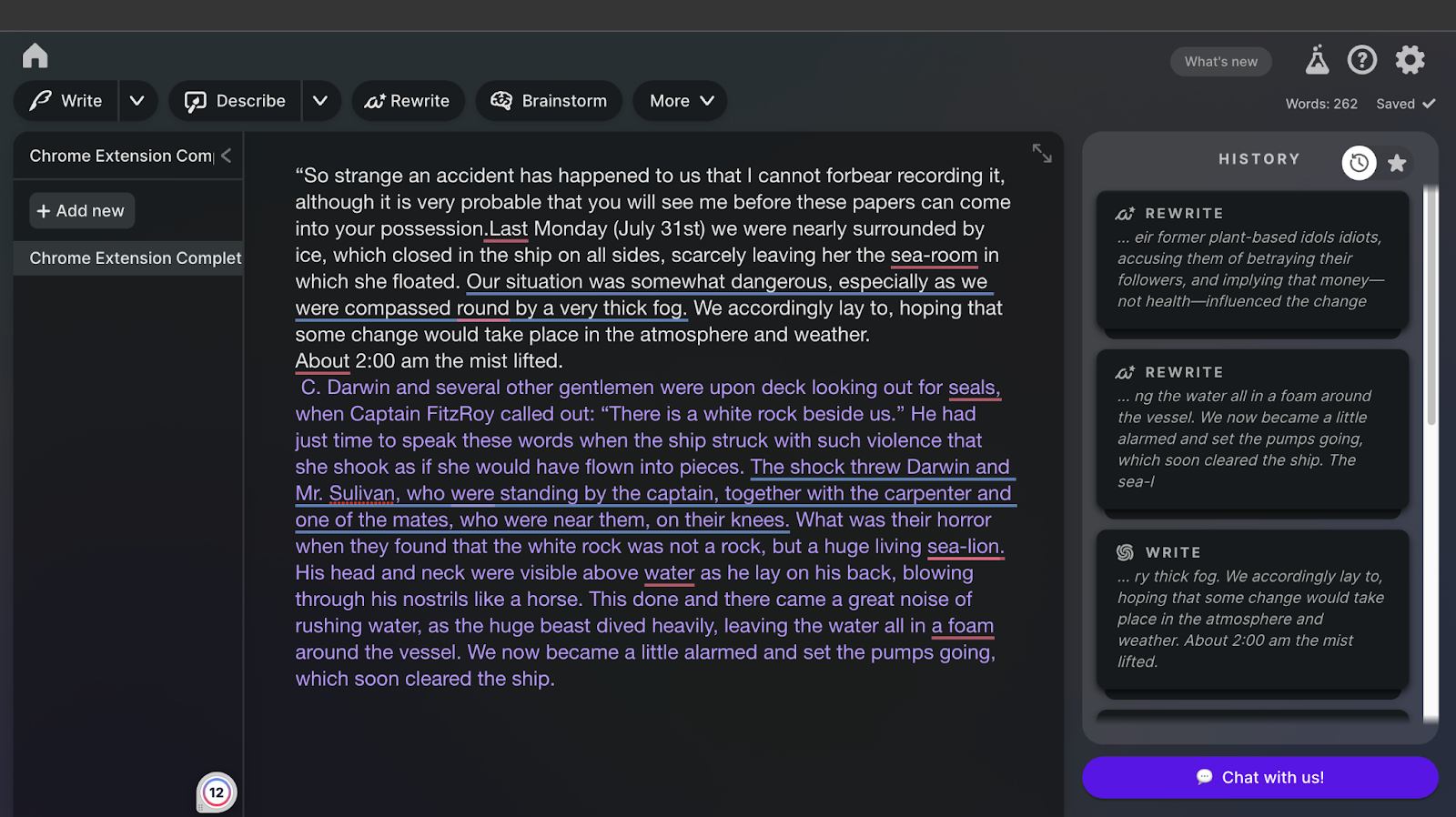by Jude Klinger
It’s happening. Call it Pandora’s box unleashing powers we do not comprehend. Call it Cassandra foretelling a future we cannot imagine. Call it augmented intelligence. Call it artificial intelligence. Call it AI for short because you are about to get intimate with it.
AI is in use in every possible field you can imagine, but this is specifically about AI as it relates to assisting a writer by getting around that nasty writer’s block, or helping to see the piece from a different perspective. AI can write, rewrite, and even create new work. The more sophisticated programs can mimic the writing style of a senior-level science advisor using complex compound sentences or the unsophisticated high school student struggling to explain the plot of Macbeth.

I decided to explore this brave new world, this assist that might make my writing better. Figuring out which program or app or extension makes the most sense felt like a car mechanic had taken my car apart, left the pieces in different piles, and then forgot to give me the instruction manual to put it back together.
The Basics
For comparison, I experimented with three AI writing programs: Foster’s Chrome extension, Lex and Sudowrite. The first hurdle was to figure out how to get started with these very different programs.
Foster’s AI is the simplest to access and is available as part of the Foster Chrome extension on Google docs. To access the app, install the Chrome extension the same as you would for any extension. Once it is installed, go to Settings and turn on “Enable AI menu”.

You can highlight any section of your work and the edit menu will appear with the option to “Suggest Edits”. Underneath your text, you can choose: Rewrite, Spice or Custom. Each option presents you with a variation of your text.
This extension is serviceable and basic. Even the “Spice” command can be quite bland, but the program is steadily evolving so it’s worthwhile to keep an eye on it as it evolves.

Lex is a standalone program, meaning you write directly on the Lex platform, not on Google docs. While it has an uncanny ability to mimic a writer’s style, it is very buggy.

Although Lex has been handing out free invitation codes like they were Halloween candy, their actual my-cousin-made-it-in-his-basement website tells you that you must get on a long waitlist to gain access. But, as with any good late-night TV ad, there’s more. If you sign up for their podcast/newsletter aggregator, you gain immediate access to Lex. The problem is the contributors to the aggregator are mostly inactive or sporadic posters at best making it a useless investment. In any case, once you activate your code, you are given five codes to share which makes the whole pay for access via the aggregator seem like an idea that was forgotten in the basement of rejected ideas.
Using a free invitation code, I sampled an excerpt from a fiction piece I’m working on. Lex returned a result that my excerpt was from another source. The program had determined that I had plagiarized my own passage, which, given the angst I’m going through on this story, was just plain nonsense. When I tried to copy/paste a document from Lex to Google Docs, the copy function was not working, so the document is now trapped on the Lex platform. I’ve contacted Lex about these bugs and am waiting for a response.

Sudowrite is the most comprehensive and sophisticated of the three I tried. You can write directly in the program or try the beta version Chrome extension for Google docs.
The extension works on the same principles as the Foster extension: highlight text, and it suggests alternatives. The desktop version can suggest, rewrite, create characters, invent plot twists, and accept custom commands like “make this more ominous” or “show, not tell”.
The Frankenstein Experiment
It seemed appropriate to select a passage from Mary Shelley’s Frankenstein to run a comparison of the programs. After all, wasn’t I putting together parts and pieces and trying to make the writing come alive?
I chose this excerpt, allowing each of the programs to complete the final sentence: Last Monday (July 31st) we were nearly surrounded by ice, which closed in the ship on all sides, scarcely leaving her the sea-room in which she floated. Our situation was somewhat dangerous, especially as we were compassed round by a very thick fog. We accordingly lay to, hoping that some change would take place in the atmosphere and weather. About two o’clock the mist cleared away,”
The Rewrites
Foster’s AI completed the last sentence with the Rewrite option: “About two o’clock the mist cleared away revealing the extent of the damage.” It offered two slight variations on that sentence.
The spice option was more emphatic: “About two o’clock the mist cleared away, revealing a stunning landscape that took my breath away.” Spice only offered one version for all three of its suggested options. There is nothing wrong with these options but they are very milquetoast. As a writing assist program, I felt it was not offering me much in the way of creative avenues to explore. As with all AI writing programs, the more it is used the more effective it will become.
Lex returned this passage, which is eerily similar to the original text:
“and we beheld, stretched out in every direction, vast plains of ice which seemed to have no end. Some of my comrades wished to descend and walk upon the ice, but I cautioned them against it, as it was very thick and might break under their weight. I advised them, therefore, to retain their places in the ship and to observe. a safe distance, while I went upon the ice to reconnoitre.”
This suggests to me that Lex has been ‘fed’ Frankenstein and was paraphrasing the original text. All AI programs become more intuitive and effective over time as the program acquires more input from original sources.
Sudowrite is like a toy box packed with shiny new objects. You bounce from one option to the next. It created a Charles Darwin character, with a new captain and an entirely different plot.

“C. Darwin and several other gentlemen were upon deck looking out for seals, when Captain FitzRoy called out: “There is a white rock beside us.” He had just time to speak these words when the ship struck with such violence that she shook as if she would have flown into pieces. The shock threw Darwin and Mr. Sulivan, who were standing by the captain, together with the carpenter and one of the mates, who were near them, on their knees. What was their horror when they found that the white rock was not a rock, but a huge living sea-lion. His head and neck were visible above water as he lay on his back, blowing through his nostrils like a horse. This done and there came a great noise of rushing water, as the huge beast dived heavily, leaving the water all in a foam around the vessel.”
(One common characteristic of all writers is we like a good distraction and Sudowrite is pure crack cocaine when it comes to distraction. On one hand, it felt a little overwhelming, on the other hand, it sure was fun to keep plugging in alternate commands and seeing what came back. ) Perhaps Sudowrite is more like a pack of wild ponies that must slowly be tamed to provide useable results.
Ethics & Morality
Once you start using this technology, you begin to see how it can be ethically challenging.
How will teachers know when that Macbeth plot essay, which is written in pitch-perfect high school student syntax, was created by AI? How will your boss know if the article you just wrote on the future of cyber currency was something you knocked out with AI? (And will she even care as long as the job gets done?) Will the winner of the Pulitzer Prize admit that his fantastic new novel was AI-enhanced? Will Stephen King no longer be the most prolific writer on earth because the programs can spit out stories even faster than he can?
For me, the most troubling aspect is the potential of AI in a learning situation. The Macbeth plot assignment isn’t looking for an in-depth analysis of power dynamics; it’s an exercise in logic, developing and presenting opinions clearly, and giving students the freedom to find their own voice. A composer needs to understand the fundamentals of music composition. A mathematician must learn her multiplication tables before leaping into quantum physics. And a high school student needs the experience of making a clear and understandable argument.
However, in a world where short-term results are frequently rewarded, encouraging students – or anyone – to write on their own is going to be very challenging. And is that even a worthy goal? Why not accept an assist in your writing if it makes it better?
The silver lining in this conundrum is that plagiarism is now much easier to identify. If you highlight suspect text, any of the programs can give you the original source. Although even that might not be reliable: there are a plethora of programs that offer to alter text subtly enough that plagiarism becomes almost impossible to identify.
Impostor Syndrome
Is there any writer who hasn’t felt unsure, inadequate or completely roadblocked? Wait until you start messing about with AI. Now you can second-guess every sentence, every word choice, every clever metaphor and synonym: Can AI do it better than me? It’s worse than having a Twitter addiction.
Remember, each program throws off different results so, of course, you have to compare them, right? And then there are those incredibly distracting little popup menus constantly asking you if you want to rewrite.
As if you weren’t already paranoid about your writing. Now you have an excuse to keep fiddling with your text for all eternity.

The Future
Whether we embrace it or not, AI is part and parcel of the writer’s tools. Currently, these programs run on something called GPT-3, but the techno-junkies are salivating over GPT-4, which is due to come out in December (or maybe it’s February …). The rumor mill has gone into overdrive, as everyone who knows anything has signed an NDA that involves death by firing squad. Anyone who tells you they know where this will lead either has a high-functioning crystal ball or is a deluded narcissist.
My prediction is AI is only going to become more powerful and more pervasive.
There will be calls for government protections and rules and regulations and all sorts of things that our current governments are not prepared to handle. (If you watched Mark Zuckerberg being interrogated by Congress a few years back, you know that foremost in the Congressmen’s minds was how to change their passwords.) This will be the wild west for the foreseeable future. I cannot imagine any government entity wrapping its laws around all the myriad environments that will be impacted by AI.
Where does that leave us? Poor writers. Poor editors. Have the machines won?
No. I don’t believe that.
My hope is that writers and editors will learn to harness the power of AI and make good choices. It is in the choosing of exactly which words to commit to pixels that we will distinguish ourselves as creative, original people.
Foster offers world-class editing and collaboration for every type of writer and team. Learn more here, or apply to become a contributor.
